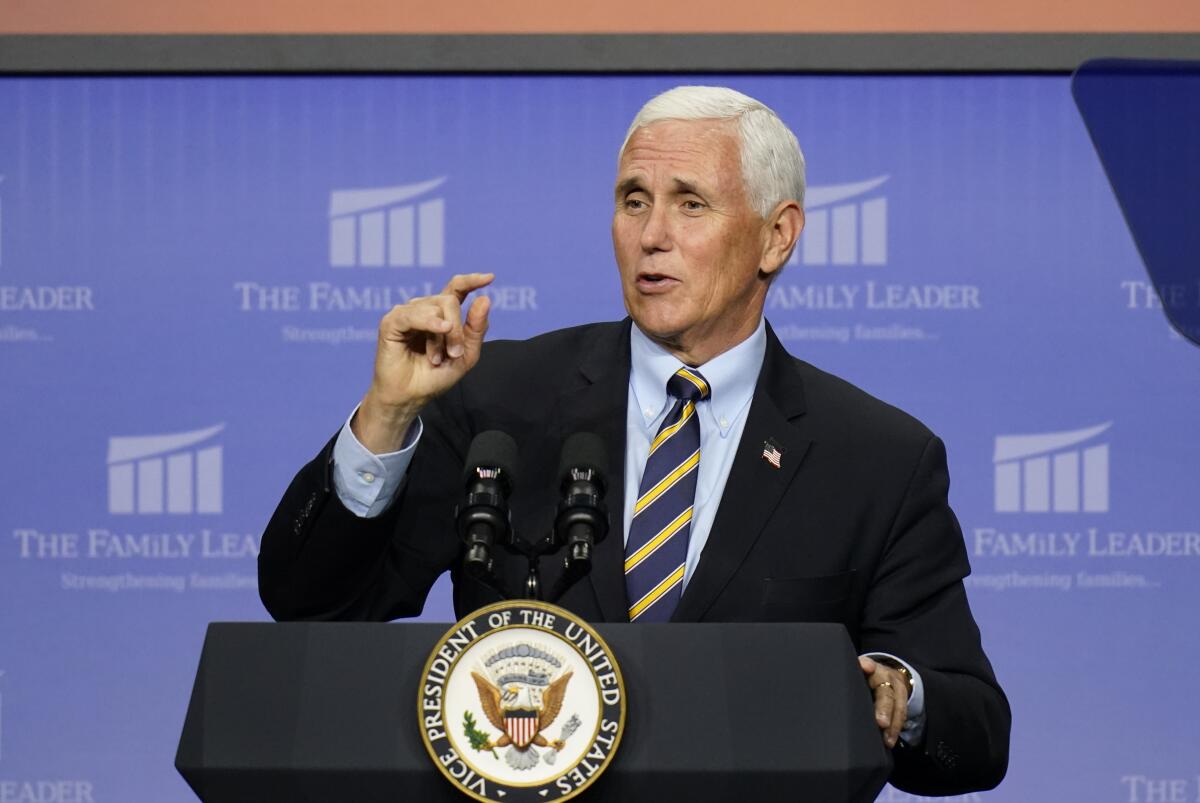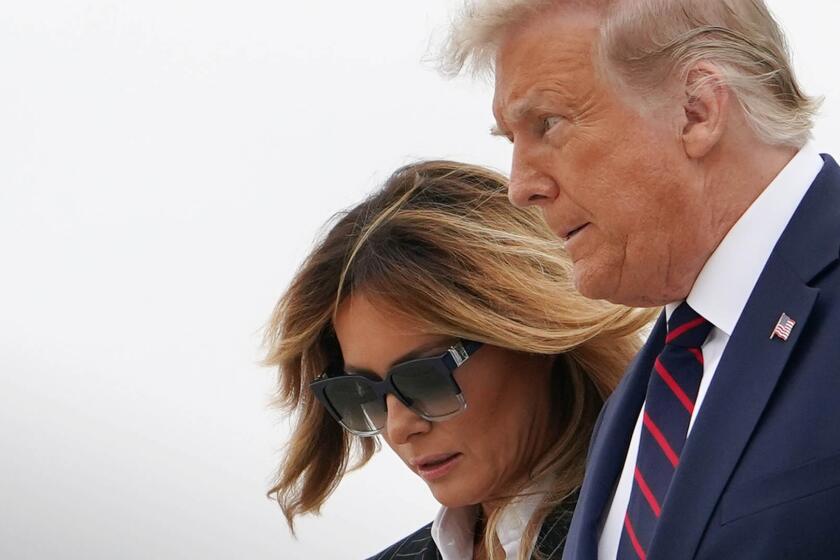Trump was running out of time in Iowa even before he went into quarantine

WEST DES MOINES, Iowa — Sara Truesdell, a Christian conservative who voted for President Trump in 2016, is almost begging for a reason to back him again.
But the substitute teacher and stay-at-home mom wants a candidate who will “be an example of Christ,” she said outside a Target here, a suburb full of gleaming retail centers, fast-food chains and newly built townhouses behind outlet stores.
Janet Khongmaly, who also voted for Trump four years ago, is more blunt. “He’s fine until he talks,” the 49-year-old nurse said.
The fact that Trump can’t count on suburban conservative women like Truesdell and Khongmaly less than five weeks before the election — and with early voting starting here Monday — is a giant red flag for his campaign.
Polls show the president in a dead heat with Democrat Joe Biden in Iowa, a state that Trump won by more than 9 percentage points in 2016, bigger than his margin in Texas.
Even before his COVID-19 diagnosis Friday, Trump was running out of time to alter the contours of a race that has been stubbornly stable across the country for months. Now, with the president hospitalized in Walter Reed National Military Medical Center for at least the next few days, his campaign is on hold.
President Trump and First Lady Melania Trump have tested positive for the coronavirus, the president tweeted early Friday.
That may leave many voters’ last impression of Trump as his combative performance in his debate with Biden on Tuesday, when he repeatedly interrupted Biden and the moderator and refused to denounce a violent far-right group.
Some former Trump voters here said they were troubled by the president’s conduct at the debate.
“I was expecting to see clarity. And I’m just very disappointed by the behavior, the lack of really poignant speaking to the issues,” said Don Hensley, 50, who develops food products. He voted for Trump in 2016 but is uncertain now if he will even vote.
Iowa wasn’t supposed to be a hard state for Trump this time.
Iowa voted for Barack Obama in 2008 and 2012 but swung more decisively in Trump’s favor than Michigan, Wisconsin, Ohio and Pennsylvania, the other four states with large white rural populations that flipped in 2016. No other state saw as many counties — 31 — flip from blue to red.
But the pool of undecided or persuadable voters is smaller this year than it was in 2016, when Trump benefited from voters who disliked Democratic nominee Hillary Clinton, as well as several unusual factors late in the race.
They included the release of damaging Democratic emails hacked by Russian operatives and an announcement by then-FBI director James B. Comey, less than two weeks before election day, that he was investigating Clinton’s private email server.
Fortune could strike again for Trump. But for now, he is struggling not just to expand his base but also to close the deal with some of his former supporters. Interviews in Iowa showed many voters are still trying to overcome their reservations about his boorish behavior and harsh rhetoric.
“He hasn’t learned by now?” Khongmaly said of Trump, who promised that he could act “more presidential” than Lincoln.
Most other Iowa voters have made up their minds. A recent Des Moines Register poll showed Trump and Biden tied at 47%, with 4% planning to vote for other candidates and just 3% undecided.
The two campaigns are thus slugging it out here. Biden, who has a large cash advantage over Trump, has begun airing ads here. The Trump campaign sent Vice President Mike Pence for a visit Thursday.
“The road to victory runs straight through Iowa,” Pence told a few hundred supporters in Carter Lake, near the Nebraska border.
The Register poll showed the economy and law and order are the leading issues for Republicans, while Democrats care most about the pandemic and healthcare.
Trump called the coronavirus “a hoax,” said Kathy Hoover, a 51-year-old retired teacher who supports Biden. “In the beginning, he didn’t tell what actually was going on because he was afraid of a panic. He didn’t give the American people enough credit to handle whatever panic came along.”
Voters also face a daily barrage of ads from Sen. Joni Ernst, the Republican incumbent, and her Democratic challenger, Theresa Greenfield. It is the nation’s second-most expensive Senate race, behind North Carolina, with candidates and outside groups spending more than $90 million, according to the Center for Responsive Politics.
Republicans are confident they will win again here. One Trump campaign official who was not authorized to speak for the campaign said he puts Iowa in a basket with Georgia and Texas, which look close in polls but are not viewed internally as tight.
Trump won last time by promising to fight for farmers abroad and to bring back manufacturing jobs. He won almost every rural county to outweigh Clinton’s advantages in Des Moines and five other counties.
But his trade wars with China and Brazil since 2017 have hurt Iowa’s farmers. The president has taken pains to keep them from defecting, lavishing subsidies despite Republicans’ stated philosophy of opposing government intervention in the market.
“He’s buying them off,” said Carol Kriegel, whose husband used to run a farm. She declined to say whom she will vote for but said that many of her friends and relatives support Trump.
Kriegel sipped coffee with a group of other retired women at the Brooklyn Grocery store, a gathering spot in rural Poweshiek County, which is split between farmers and Grinnell College. Trump won the county comfortably in 2016.
Corn seeds from trucks are strewn on the paved streets in the small downtown, where a grain co-op is near the bank, the post office and other essential businesses, with a feed store around the corner.
Jay Foster, who manages a grain co-op in nearby Malcom, said farmers are struggling with the effects of a devastating derecho windstorm in August that blew away corn and beans and crushed large metal grain elevators, including five in Malcom.
He acknowledged that Trump’s trade wars were hard on local farmers but said they still largely support the president.
“It’s the right thing in the long run,” Foster said. “In the short run, it’s tough.”
More to Read
Get the L.A. Times Politics newsletter
Deeply reported insights into legislation, politics and policy from Sacramento, Washington and beyond. In your inbox three times per week.
You may occasionally receive promotional content from the Los Angeles Times.












